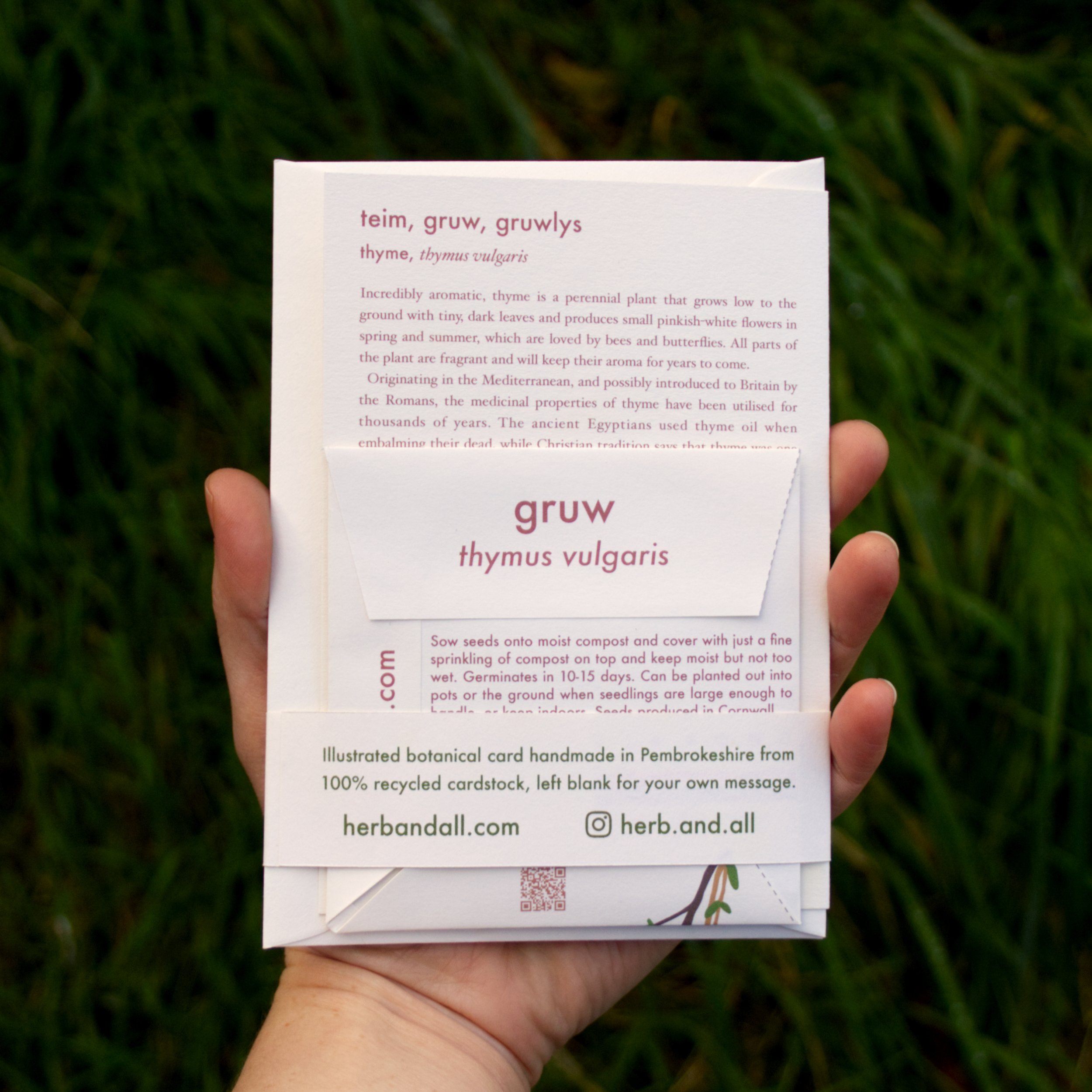 Image 1 of 5
Image 1 of 5

 Image 2 of 5
Image 2 of 5

 Image 3 of 5
Image 3 of 5

 Image 4 of 5
Image 4 of 5

 Image 5 of 5
Image 5 of 5






teim - welsh botanical card with thyme seeds
Handmade illustrated A6 blank card, with thyme seeds to sow and grow. Card, envelope and seed packet made from 100% recycled paper.
Incredibly aromatic, thyme is a perennial plant that grows low to the ground with tiny, dark leaves and produces small pinkish-white flowers in spring and summer, which are loved by bees and butterflies. All parts of the plant are fragrant and will keep their aroma for years to come.
Originating in the Mediterranean, and possibly introduced to Britain by the Romans, the medicinal properties of thyme have been utilised for thousands of years. The ancient Egyptians used thyme oil when embalming their dead, while Christian tradition says that thyme was one of the herbs placed in baby Jesus’ manger.
In Welsh folklore, thyme was planted in ‘old-fashioned’ gardens to bring luck, as well as scaring away witches and unwanted fairies. The plant was also associated with death and love, and was scattered onto coffins in the grave and worn by girls in hope of finding their sweetheart, along with mint and lavender.
The medieval Welsh herbalists the Physicians of Myddfai used a hot salve made from wild thyme to ease colds and muscular pain. The plant is highly antiseptic and contains antispasmodic, carminative, deodorant, anthelmintic and expectorant properties, making it one of the best herbs for treating coughs, sore throats and mouth problems, as well as helping with digestion and bloating.
Thyme is a classic herb in the kitchen and a popular ingredient in Welsh cawl. Growing wild on Greek hillsides, thyme gives Greek honey its distinctive flavour and historically the plant was rubbed onto hives to attract the bees.
Note: do not use in large quantities if pregnant.
Handmade in Pembrokeshire from 100% recycled card.
Handmade illustrated A6 blank card, with thyme seeds to sow and grow. Card, envelope and seed packet made from 100% recycled paper.
Incredibly aromatic, thyme is a perennial plant that grows low to the ground with tiny, dark leaves and produces small pinkish-white flowers in spring and summer, which are loved by bees and butterflies. All parts of the plant are fragrant and will keep their aroma for years to come.
Originating in the Mediterranean, and possibly introduced to Britain by the Romans, the medicinal properties of thyme have been utilised for thousands of years. The ancient Egyptians used thyme oil when embalming their dead, while Christian tradition says that thyme was one of the herbs placed in baby Jesus’ manger.
In Welsh folklore, thyme was planted in ‘old-fashioned’ gardens to bring luck, as well as scaring away witches and unwanted fairies. The plant was also associated with death and love, and was scattered onto coffins in the grave and worn by girls in hope of finding their sweetheart, along with mint and lavender.
The medieval Welsh herbalists the Physicians of Myddfai used a hot salve made from wild thyme to ease colds and muscular pain. The plant is highly antiseptic and contains antispasmodic, carminative, deodorant, anthelmintic and expectorant properties, making it one of the best herbs for treating coughs, sore throats and mouth problems, as well as helping with digestion and bloating.
Thyme is a classic herb in the kitchen and a popular ingredient in Welsh cawl. Growing wild on Greek hillsides, thyme gives Greek honey its distinctive flavour and historically the plant was rubbed onto hives to attract the bees.
Note: do not use in large quantities if pregnant.
Handmade in Pembrokeshire from 100% recycled card.